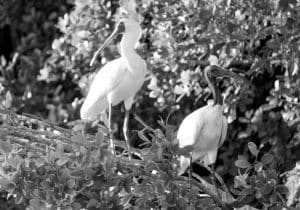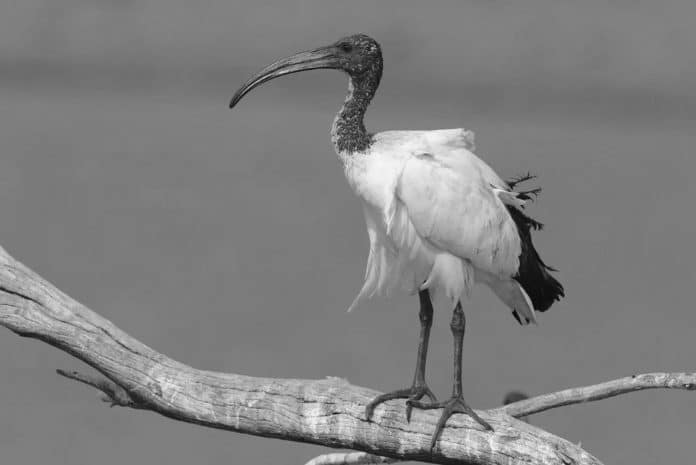Introduction to the African Sacred Ibis
Welcome to the captivating world of the African Sacred Ibis in Tanzania. This unique bird species, scientifically known as Threskiornis aethiopicus, holds a significant place in the rich biodiversity of Tanzania. The African Sacred Ibis is renowned for its striking appearance, with its white plumage, long curved bill, and black head and neck. Found in various regions across Tanzania, this elegant bird has long been associated with cultural and spiritual significance, making it an intriguing subject for exploration.

The African Sacred Ibis is a captivating avian species that has captured the fascination of both locals and visitors alike. Its distinct appearance and graceful presence have made it a symbol of fascination and reverence in Tanzanian culture. Known for its long legs and impressive wingspan, the African Sacred Ibis is a sight to behold as it graces the skies and landscapes of Tanzania. As we delve into the world of this remarkable bird, we will explore its distribution, habitat, and the symbolism it holds within Tanzanian culture.
Distribution and Habitat of the African Sacred Ibis in Tanzania
The African Sacred Ibis is widely distributed across various regions of Tanzania, showcasing its adaptability to diverse habitats. From the lush wetlands of the Rufiji River Basin to the coastal plains of the Indian Ocean, the African Sacred Ibis has carved out its presence in a range of ecosystems. These birds are often found in marshes, swamps, and shallow waters, where they forage for food and build their nests in the surrounding trees and reeds.
In addition to wetland habitats, the African Sacred Ibis also frequents agricultural areas, where it can be seen foraging for insects and small invertebrates. The adaptability of the African Sacred Ibis to both natural and human-altered landscapes is a testament to its resilience in the face of environmental changes. As we explore the distribution and habitat of the African Sacred Ibis in Tanzania, it becomes evident that these birds play a vital role in the ecological tapestry of the country.
Symbolism of the African Sacred Ibis in Tanzanian Culture
The African Sacred Ibis holds deep cultural and symbolic significance in Tanzanian traditions and beliefs. In various local communities, the presence of the African Sacred Ibis is often associated with themes of purity, protection, and spirituality. The striking contrast of its white plumage against the backdrop of Tanzania’s diverse landscapes has inspired folklore and symbolism that is woven into the fabric of Tanzanian culture.
In some traditions, the African Sacred Ibis is revered as a guardian spirit, symbolizing protection and guidance for those who encounter it. Its elegant presence and graceful demeanor have led to it being associated with themes of peace and harmony in Tanzanian folklore. As we journey into the symbolism of the African Sacred Ibis in Tanzanian culture, we gain a deeper appreciation for the profound connection between nature and human beliefs.
Conservation Status of the African Sacred Ibis in Tanzania
Understanding the conservation status of the African Sacred Ibis in Tanzania is crucial for ensuring the long-term survival of this iconic bird species. The International Union for Conservation of Nature (IUCN) has classified the African Sacred Ibis as a species of “Least Concern” globally, indicating that it is not currently facing imminent threats of extinction on a global scale. However, it is essential to consider the local conservation status and specific challenges faced by the population of African Sacred Ibis in Tanzania.
Tanzania’s commitment to wildlife conservation has led to the establishment of protected areas and conservation initiatives aimed at safeguarding the country’s diverse flora and fauna. The conservation status of the African Sacred Ibis in Tanzania reflects the broader efforts to preserve the country’s natural heritage and maintain ecological balance. As we delve into the conservation status of the African Sacred Ibis in Tanzania, we gain insights into the ongoing efforts to protect and sustainably manage its population.
Threats to the African Sacred Ibis Population in Tanzania

Despite its “Least Concern” status on a global scale, the African Sacred Ibis in Tanzania faces a range of threats that impact its population and habitat. Habitat loss due to human activities such as agriculture, urbanization, and infrastructure development poses a significant challenge to the conservation of the African Sacred Ibis. Wetland degradation and pollution further exacerbate the pressures on the habitats essential for the survival of these elegant birds.
Additionally, the African Sacred Ibis is vulnerable to hunting and capture for traditional and cultural practices in some areas of Tanzania. Human-wildlife conflict, electrocution from power lines, and predation also contribute to the challenges faced by the population of African Sacred Ibis in Tanzania. Recognizing and addressing these threats is vital for the sustainable coexistence of the African Sacred Ibis and human communities in Tanzania.
Conservation Efforts and Initiatives for the African Sacred Ibis in Tanzania
Efforts to conserve the African Sacred Ibis in Tanzania are driven by a combination of governmental, non-governmental, and community-based initiatives. The establishment of protected areas and wetland conservation projects has contributed to the preservation of vital habitats for the African Sacred Ibis. Collaborative research and monitoring programs have enhanced our understanding of the species’ ecology and behavior, informing targeted conservation strategies.
Engagement with local communities and stakeholders has been instrumental in promoting awareness and fostering a sense of stewardship for the African Sacred Ibis and its habitat. Conservation education programs, capacity building, and sustainable livelihood initiatives have empowered communities to participate in the protection of the African Sacred Ibis. By exploring the diverse conservation efforts and initiatives for the African Sacred Ibis in Tanzania, we uncover the collective dedication to safeguarding this iconic bird species.
The Role of Local Communities in the Conservation of the African Sacred Ibis
Local communities play a pivotal role in the conservation of the African Sacred Ibis in Tanzania, serving as custodians of the natural landscapes that the birds depend on for survival. Through community-based conservation projects, traditional knowledge and practices are integrated with modern conservation strategies to create a harmonious coexistence between people and wildlife. By involving local communities in decision-making processes and resource management, the conservation of the African Sacred Ibis becomes intertwined with the well-being of the communities themselves.
Community-led initiatives such as habitat restoration, sustainable land use practices, and eco-tourism enterprises contribute to the conservation of the African Sacred Ibis while providing economic opportunities for local residents. The active participation of local communities in monitoring and protecting the habitats of the African Sacred Ibis fosters a sense of ownership and responsibility, leading to sustainable conservation outcomes. By recognizing and honoring the role of local communities in the conservation of the African Sacred Ibis, we embrace a holistic approach to wildlife preservation in Tanzania.
Ecotourism Opportunities Related to the African Sacred Ibis in Tanzania
Tanzania’s rich biodiversity and stunning natural landscapes offer diverse ecotourism opportunities, including experiences centered around the observation and appreciation of the African Sacred Ibis. Birdwatching enthusiasts and nature lovers have the chance to witness the graceful flight and behavior of the African Sacred Ibis in its natural habitat. Guided tours to wetlands, national parks, and conservation areas provide immersive encounters with these captivating birds, offering valuable insights into their ecology and conservation significance.
Ecotourism enterprises focused on the African Sacred Ibis contribute to local economies while promoting the conservation of natural environments. By engaging in responsible and sustainable ecotourism activities, visitors directly support the preservation of the habitats and species they come to admire. The integration of ecotourism with conservation efforts creates a positive feedback loop, where the value of wildlife and natural landscapes is celebrated and protected for future generations to experience and cherish.
Conclusion and Future Outlook for the Conservation of the African Sacred Ibis in Tanzania

In conclusion, the African Sacred Ibis holds a special place in the cultural tapestry and natural heritage of Tanzania, embodying both symbolic significance and ecological importance. As we reflect on the distribution, habitat, symbolism, and conservation status of the African Sacred Ibis, it becomes evident that the preservation of this iconic bird species requires concerted efforts and a holistic approach. By addressing the threats and challenges faced by the African Sacred Ibis and embracing community-driven conservation initiatives, Tanzania is poised to secure a sustainable future for this remarkable avian species.
Looking ahead, the future outlook for the conservation of the African Sacred Ibis in Tanzania holds promise, fueled by collaboration, innovation, and shared dedication to wildlife preservation. Through continued research, conservation action, and community engagement, the African Sacred Ibis will thrive alongside the people and landscapes of Tanzania, enriching the natural heritage of the country for generations to come.


































